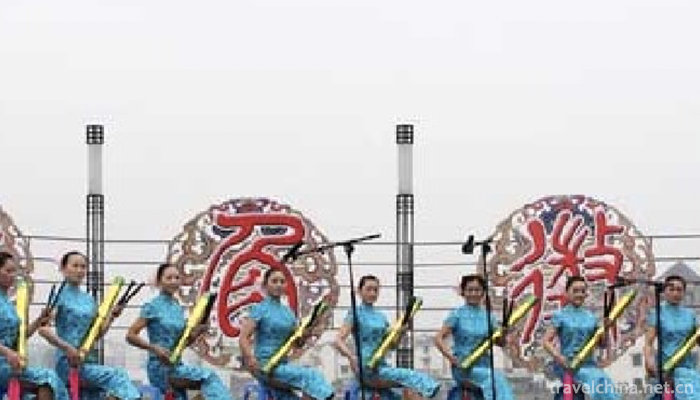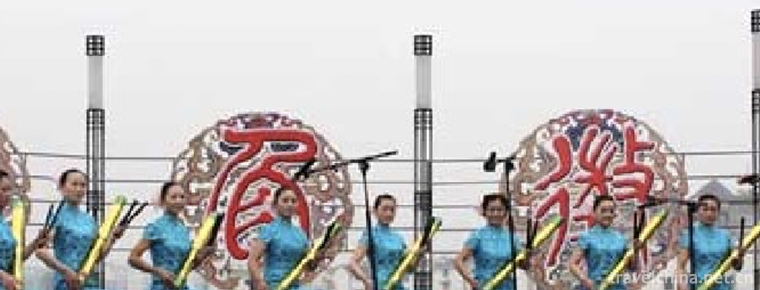chanting of folk tales to the accompaniment of bamboo percussion instruments
chanting of folk tales to the accompaniment of bamboo percussion instruments
Yugu Daoqing, also known as Bangbangqiangzi, is a kind of Han opera in Anhui Province. Beating fishing drums accompanied by singing has become a performance form of fishing drum sentiment. Fishing drums have been popular since the late Qing Dynasty and have a history of more than 100 years. Its form is to use three feet three inches long bamboo tube, covered with pig's guard leather, with wooden wooden board to beat and make rounding rap. One Person sings accompaniment, right hand beats fishing drum, left hand beats bamboo board as accompaniment. Popular in China's civil society, as a kind of Han rap art which advocates Taoism, is the way of Taoism to help the world and to spread Taoist doctrine.
brief introduction
Yugu Daoqing, also known as Bangbangqiangzi, is a kind of Han opera in Anhui Province. Beating fishing drums accompanied by singing has become a performance form of fishing drum sentiment. Fishing drums have been popular since the late Qing Dynasty and have a history of more than 100 years. Its form is to use three feet three inches long bamboo tube, covered with pig's guard leather, with wooden wooden board to beat and make rounding rap. One Person sings accompaniment, right hand beats fishing drum, left hand beats bamboo board as accompaniment. Popular in China's civil society, as a kind of Han rap art which advocates Taoism, is the way of Taoism to help the world and to spread Taoist doctrine.
Singing Form
Fishing drum is an art form for fishermen to enjoy themselves. The main form of rap is group sitting and singing. There are also singers and double singers. Music rhythm changes very flexibly, 4/4, 3/4 of the rhythm appears alternately, music is extremely unique. Its slab style includes "slow slab", "flat slab", "number slab", "three-pull-out", "rhyme", "plain white", "introduction to the stage" and "poem on the stage".
Historical Origin
"Tao Qing" is a special opera of Taikang, which originated from the song of Taoism in the late Ming and early Qing Dynasties. It was called "Yu Gu Dao Qing" in ancient times because Taoist priests sang music accompanied by fishing drums. It spread in northern Anhui in the Ming and Qing Dynasties, and formed the art of music and singing after the amalgamation of the Han folk minor "Ying Ge Liu" in Fuyang area of Anhui Province. Later Qing Dynasty (1860) It was introduced to Xihua, Qixian and Taikang from Shenqiu and Dancheng.
Taoist sentiment is popular in Chinese civil society. As a kind of Han rap art, it is a way of Taoism to help the world and spread Taoist doctrine. Based on the detailed investigation of the relevant materials in historical books and Taoist scriptures, this paper holds that Taoist sentiment had been created as early as the Five Dynasties, and Taoist priests sang Taoist sentiment in order to propagate Taoism. Taoist art is the product of Taoist folk culture. Taoist works by Taoists and literati in Song, Yuan, Ming and Qing dynasties reflect the influence of Taoism on Chinese popular literature and the dominant position of Taoism in Chinese Han belief system.
The fishing drum is a form of plate and chamber quyi. It originated from the late Qianlong period of the Qing Dynasty. It was taught by a fishing drum artist who lived in a salt depression area due to famine. After that, he constantly absorbed the nutrition and essence of local folk songs, and gradually developed into a fast-paced, tunic and comfortable local flavor. Special music is one of 26 kinds of music in China.
In 2011, it was selected as the third batch of national intangible cultural heritage list.
Inheritance Significance
Yugudao opera is rich in repertoire, close to the people, rich in local flavor, is an ancient and rare opera. It is urgent to inherit and carry forward.


-
1.barbecued porkTime 2018-11-02
-
2.Great mercy Pavilion Plain noodle
Great mercy Pavilion Plain noodle, originated in Zhaitang of Daci Pavilion Chan Yuan in Baoding City, Hebei Province, has a history of 800 years.
Time 2018-11-27 -
3.Zhongshan Park
Zhongshan Park is located in the south of the Forbidden City (Palace Museum) in the center of Beijing, west of Tian'anmen, and separated from the Palace Museum.
Time 2018-12-22 -
4.Lianhuashan Ski Resort
Located in Zhangzhen, Shunyi District, Beijing, Lianhuashan Skiing Ground covers an area of more than 1 million square meters and was opened on December 19, 2003.
Time 2019-01-29 -
5.Daur Costume
The Daur nationality has a long history and agricultural culture in northern China. Daur garments are greatly influenced by Mongolian and Manchu nationalities.
Time 2019-04-22 -
6.Ancient Platform Building Skills
Architectural skill of ancient stage is an important traditional skill in folk architecture. In the traditional techniques of ancient stage construction, sawyers, big woodworkers, small woodworkers
Time 2019-05-01 -
7.The Story of Guangchan Marquis
The story of Guangchan Marquis refers to a local folklore widely circulated in Yangcheng County, Jincheng City. Guangchan Marquis refers to an ordinary folk veterinarian in the Northern Song Dynasty
Time 2019-05-01 -
8.Ha Ni Ha Ba
Ha Ni Ha Ba, an important part of Chinese Hani folk literature. Hani Haba, which means Hani ancient songs, is a popular and far-reaching folk song in Hani social life.
Time 2019-05-02 -
9.Gelao Maolong Festival
"Gelao Maolong" is a form of folk worship handed down from generation to generation by Shiqiao Gelao people. It mainly spreads in the Ming and Longfeng villages of Longjing and Tangshan town
Time 2019-07-13 -
10.Southwest Minzu University
Make great efforts, and the years will be golden. Southwest University for Nationalities is located in Chengdu, a famous historical and cultural city with the reputation of "the kingdom of heaven
Time 2019-08-31 -
11.Luocheng ancient town
Luocheng ancient town, known as "China's Noah Ark", is located in the northeast of Qianwei County, 60 kilometers away from Leshan City and 25 kilometers away from Qianwei county. There are seven ethnic groups, Han, Hui, Yi, man, Tibetan, Li and Miao.
Time 2020-10-15 -
12.National characteristics of Chinese embroidery
Nationality is the distinctive feature of Qinghai Folk Embroidery. In the long process of development, Qinghai embroidery has formed its own unique style. Due to the consistency of language, religious belief, festival etiquette, culture and entertainment,
Time 2020-12-12